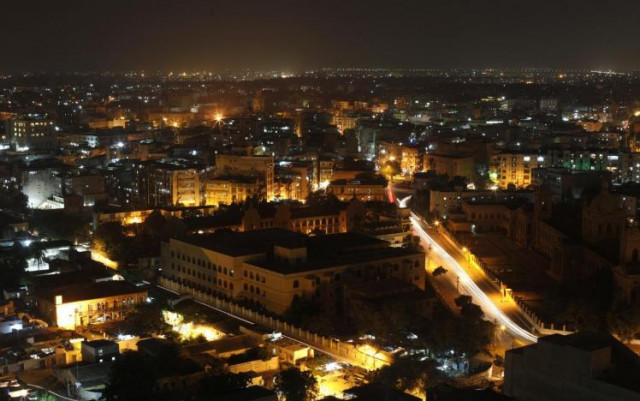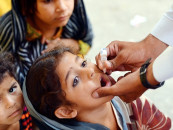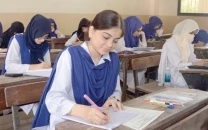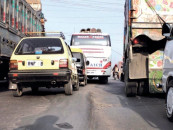Experts lament lack of planning in Karachi's development
80% of health budget being spent on 30% urban population, says Dr Tipu Sultan

View of city skyline at dusk in Karachi. PHOTO: REUTERS
This was the crux of a discussion by panelists of a session on 'Ecology of Karachi in Neoliberal World' as part of the three-day Karachi Conference held at the Arts Council of Pakistan, Karachi on Sunday.
The panelists included experts in town planning and urbanisation, solid waste management, environment and ecology. Urban planner Farhan Anwar chaired the session while journalist Mahim Maher was the discussant.
Anwar said there was no proper plan made for the development of a metropolis like Karachi, adding that it was important to understand the ecology of the port city before developing a master plan.
Taimur Suri, who teaches culture-related courses, presented a paper on cultural ecology and city's iconic Bin Qasim Park. He said there was a need to understand the impact of parks on the lifestyle of people.
He showed the latest pictures of the park, which depicted its barren land on which manholes were apparent. Suri claimed that a sewerage system was being laid beneath the park's land to benefit commercial companies.
The soul of the city has lost its charm
Lawyer Shahab Usto, on whose petition the Supreme Court constituted a one-man judicial commission to investigate the failure of the authorities to provide clean drinking water and sanitation in Sindh, said the provision of clean drinking water is a fundamental right of every citizen guaranteed under Article 9 of the Constitution.
He also showed a video based on the visits of the inquiry officer to freshwater and groundwater resources in most parts of the province as part of inspections that unveiled that up to 85% of the people in Sindh were forced to drink unsafe and filthy water. In Karachi, up to 91% of water supplied to its residents is similarly not safe for human consumption, while in public hospitals up to 85.4% of the water consumed was unfit for humans.
Usto claimed that none of the 7,000 reverse osmosis (RO) plants proudly installed by the provincial government across the province were providing safe drinking water as determined by the World Health Organisation (WHO).
In his presentation on health and the pharmaceutical industry, Dr Tipu Sultan said Pakistan had high rate of maternal mortality, almost equal to the war-torn Afghanistan.
Karachi, and its issues, not a new phenomenon
Despite being the world's fifth largest population, a nuclear power and one of the big artilleries, the country ranked third highest in terms of the burden of diseases, as it spent merely 1% of the GDP on health, Dr Sultan maintained.
Highlighting mismanagement in the health sector, Dr Sultan said 80% of the health budget was spent on the 30% urban population, while in sheer contrast, 20% funds were spent on 70% rural population.
He underscored the need for action on the part of the regulatory bodies to stop unethical practices committed by pharmaceutical companies.
Syed Muhammad Taha, the general secretary of civic rights group #FixIt, said that the 35 million youth of the country need to stand up for their rights to change the system.
Inspired by a campaign launched in Russia to draw the leaders' sketches on roads to move them into action to fix civic problems, Taha said #FixIt also initiated a similar campaign in Karachi by drawing the images of then Sindh chief minister Syed Qaim Ali Shah on the roads. However, the campaign achieved no result, as funds allocated by the government to fix the open manholes were embezzled by corrupt officials, he claimed.
'EIA public hearings have become a meaningless formality'
In his presentation titled 'Modernisation of Solid Waste Management: Past and Present', Dr Mansoor Ali said Karachi had the potential to reduce the garbage generation by 20% as the public had basic sense of solid waste management, adding that the reduction in garbage generation could be achieved up to 40% if the government acted in a proper way.
Dr Ali and other panelists believed that more landfill sites were needed to ensure proper disposal of the garbage. Commenting on the move by the Sindh government to award contract of collecting solid waste in the city to a Chinese firm, the experts said the idea had somehow failed as the company did not have an ultimate system to finally dispose of the garbage.
Concluding the session, Anwar said goals could not be achieved without having proper governance system, adding that the good governance required well-thought conceptual planning and infrastructure, while the projects came at the later stage. However in Pakistan, the government works on projects such as the Bus Rapid Transit System or Karachi Circular Railway, which were not part of a proper plan.
The government should learn from the successful models of town planning such as Khuda Ki Basti and others evolved and executed by the non-profit organisations and improve the working of its departments, Anwar summed up.



















COMMENTS
Comments are moderated and generally will be posted if they are on-topic and not abusive.
For more information, please see our Comments FAQ